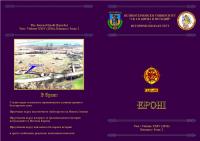БЪЛГАРСКАТА ЗЕМЕДЕЛСКА И КООПЕРАТИВНА БАНКА И БЕЖАНСКИЯТ
ВЪПРОС В БЪЛГАРИЯ В КРАЯ НА ВТОРАТА СВЕТОВНА ВОЙНА (СЕПТЕМВРИ 1944 – АПРИЛ 1945 г.)
THE BULGARIAN AGRICULTURAL AND COOPERATIVE BANK AND THE REFUGEE ISSUE IN BULGARIA AT THE END OF WORLD WAR II (SEPTEMBER 1944 – APRIL 1945)
Author(s): Yordan MantarlievSubject(s): Politics / Political Sciences, Politics, History, Law, Constitution, Jurisprudence, Civil Society, Governance, Public Administration, Recent History (1900 till today), Economic policy, WW II and following years (1940 - 1949), Law on Economics, Fiscal Politics / Budgeting
Published by: Великотърновски университет „Св. св. Кирил и Методий”
Keywords: refugees; settlers; affidavit; World War II; the Paris Peace Conference of 1946; the Bulgarian Agricultural and Cooperative Bank
Summary/Abstract: The article studies the activities of the Bulgarian Agricultural and Cooperative Bank (BZKB) after World War II, as „the largest banking institution in the economic sphere”, in collecting and reporting statistical data from refugees who in the period 1941–1944, had left for and settled in the so-called „newly liberated lands” in Greek and Yugoslav territory to devote themselves to peaceful and productive economic activities. At the end of World War II, however, when Greece and Yugoslavia re-established their authority in Western Thrace, Vardar Macedonia and the Western Bulgarian Outlands, Bulgaria once again became a refuge for thousands of its citizens full of suffering. The information collected in the branch offices of BZKB about the refugees’ abandoned movable and immovable property was used for the working out of the Bulgarian defence arguments produced at the Paris Peace Conference (July 29 – October 15, 1946) to counter the excessive and absurd Greek financial and territorial claims.
Journal: Епохи
- Issue Year: 24/2016
- Issue No: 2
- Page Range: 290-301
- Page Count: 12
- Language: Bulgarian

